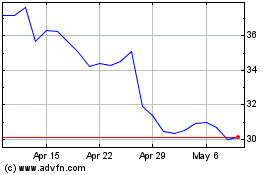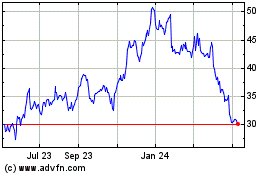Supreme Court Ruling Opens Door for More 401(k) Suits
February 27 2020 - 2:09PM
Dow Jones News
By Anne Tergesen
A Supreme Court decision Wednesday in a case against Intel Corp.
alleging problems in its 401(k) plan is likely to pave the way for
more litigation over retirement plans, industry watchers say.
The decision "has pretty significant ramifications for people's
ability to bring lawsuits over fiduciary breaches," said Michael
Kreps, a principal at Groom Law Group who specializes in
retirement-plan law.
In recent years, employees have launched a wave of lawsuits that
have resulted in multimillion-dollar settlements against companies.
Many of those suits alleged the plans had high fees.
Wednesday's unanimous decision in Intel v. Sulyma concerned a
statute of limitations for filing lawsuits under the Employee
Retirement Income Security Act, a federal law that applies to
private employers' retirement plans.
At issue is a provision in the law that gives 401(k)
participants three years to file a lawsuit after obtaining "actual
knowledge" that an employer has allegedly breached its fiduciary
duty to manage the plan in employees' best interests, said the
opinion, written by Justice Samuel Alito.
The case alleges Intel breached its fiduciary duties when it
invested a portion of employees' contributions in higher-fee
investments, including hedge funds, private equity and commodities,
within the target-date funds that serve as the plan's default
investments. Intel argued the case should be dismissed, citing the
three year deadline after Christopher Sulyma received
disclosures.
The court sided with Mr. Sulyma, who worked at Intel from 2010
to 2012 and "testified that he did not remember reviewing the
relevant disclosures," the opinion said.
The case will return to a lower court. A spokeswoman for Intel
declined to comment.
The decision means it isn't enough for an employer to send
disclosures to start the three-year statute of limitations, Mr.
Kreps said. Instead, an employee has to have read the information
and understood it for the window for filing lawsuits to begin, he
added.
The decision may encourage companies to outsource their 401(k)
plans by joining so-called multiple-employer plans, in which
companies jointly offer a retirement plan managed by a third party,
such as a brokerage firm, said Lew Minsky, president of the Defined
Contribution Institutional Investment Association, a research and
advocacy organization for consultants and others in the 401(k)
industry.
Mr. Kreps said the decision may hasten the adoption of
electronic delivery of disclosures, which makes it easier for
employers "to determine whether individuals opened a particular
mailing." That could be considered evidence in favor of starting
the three-year window to file a lawsuit, he said.
Write to Anne Tergesen at anne.tergesen@wsj.com
(END) Dow Jones Newswires
February 27, 2020 13:54 ET (18:54 GMT)
Copyright (c) 2020 Dow Jones & Company, Inc.
Intel (NASDAQ:INTC)
Historical Stock Chart
From Mar 2024 to Apr 2024

Intel (NASDAQ:INTC)
Historical Stock Chart
From Apr 2023 to Apr 2024
